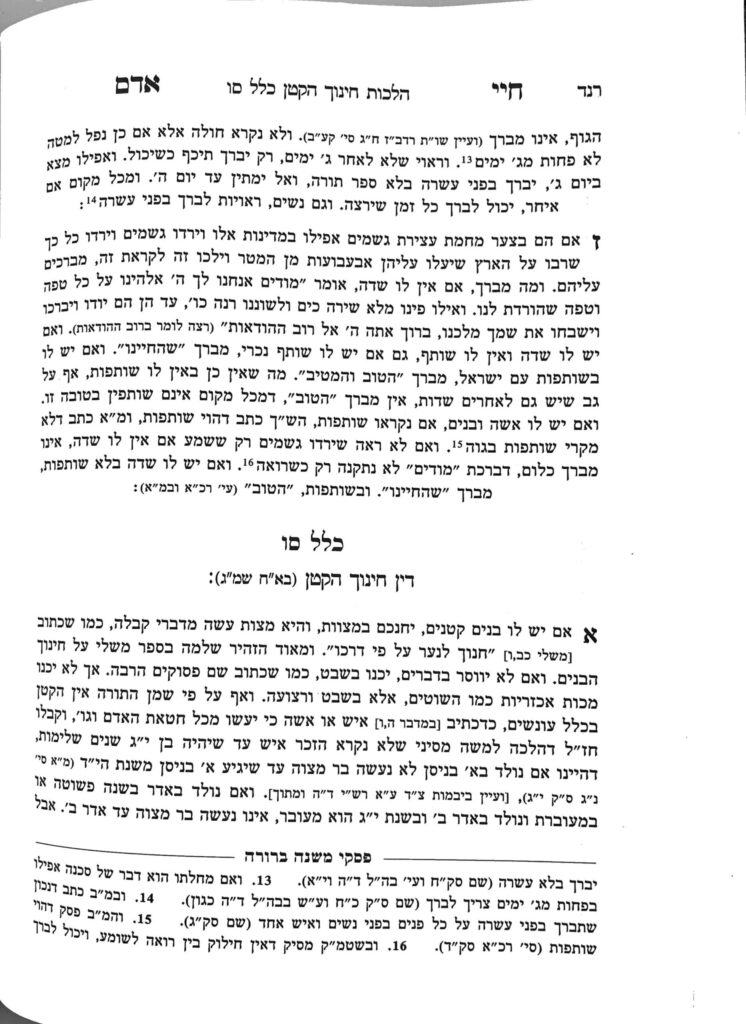We are beginning siman 1. The Chayei Adam writes one who has children under bar mitzvah has a positive mitzvah to be mechaneich them. This mitzvah is midivrei kabbalah, a chiyuv based on the pasuk in Nach, chanoch la’naar al pi darko (Mishlei 22:6).
The Chayei Adam explains that the concept of chinuch is not to train the child to do a mitzvah properly while they are a child inasmuch as it is to do it properly when they are an adult. Obviously, the best way to ensure they do it properly as an adult is to train them to do it properly as a child, but if the proper observance of the mitzvah creates too much pressure on the child, it may end up discouraging them as an adult and create the opposite effect. For example, if one brings a child to shul before they are able to sit through an entire davening, they may end up becoming trained to run around and talk during shul rather than daven. Once they have become trained in doing so as a child, it may become hard for them to change as an adult. A similar argument can be made regarding a child wearing tefillin: tefillin requires a clean body and focus on the tefillin. If a child begins wearing tefillin before they are able to focus on their tefillin, they may end up becoming trained to wear tefillin without the proper focus even as an adult.
The pasuk in Mishlei ends with gam ki yazkin lo yasur mimenu; meaning, if one provides the correct chinuch, it will ensure that when the child grows up, they will not stray from the path of that training.
It is interesting to note that there is no explicit pasuk commanding chinuch in the Torah, even though it permeates the entire torah. (The pasuk mentioned in the previous shiur, from the Meshech Chochmah, is not an explicit mitzvah.) One may conclude that there is no pasuk in the Torah because it is compelling enough as a fundamental principle of the Torah that no pasuk is necessary.
Similarly, the Ramban’s opinion is that there is no explicit pasuk requiring one to listen to the chachamim. Ramban explains that our obligation to listen to the chachamim stems from the fact that it is clearly ratzon Hashem for us to listen to them, so an explicit pasuk is unnecessary. Thus, regarding chinuch, although there is no mitzvah in the Torah per se, the clear permeation of the mitzvah throughout the Torah is a clear indication that it is ratzon Hashem.
The Chayei Adam writes that if a child will not listen through words, one may hit them. However, The Chayei Adam clarifies that one should not hit their child to cause pain, as that would be cruel and unintelligent. One should not use a painful implement, but should hit their child in a way that productively gets the message across. This caveat is especially true seeing that a katan is not yet obligated in punishment, but only in correction and training. As long as the training is beneficial, it is good, but if it is not beneficial, it is not good. We will discuss this concept further in the upcoming shiur, be’ezras Hashem.
Summary
- One has a positive mitzvah, midivrei kabbalah, to be mechaneich their children under bar mitzvah.
- The purpose of chinuch is to train the child to do the mitzvah properly as an adult. Thus, if training them in a specific mitzvah as a child will be counterproductive, one should not train them in that mitzvah until they are ready.



